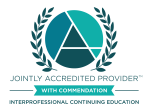Mission & Objectives
Mission Statement
The Purpose of the overall CME Program at Washington University School of Medicine is to facilitate life-long learning for healthcare practitioners and interprofessional teams to maintain and enhance professional competencies and performance to improve patient care and community health.
Content Areas addressed by the CME Program are comprehensive, evidence-based, and focus on core professional competencies. They encompass the full scope of medical and surgical practice, including basic scientific underpinnings of disease and therapeutics, medical diagnosis and treatment, preventive medicine, and eradication of health care disparities.
Target Audiences include local, national, and international healthcare practitioners, interprofessional teams, and trainees.
Types of Activities include live courses, regularly scheduled series, distance learning online, and other enduring materials.
Expected Results include improvements in knowledge, competence, and performance of healthcare practitioners and the healthcare team as well as patient and community health outcomes.
Accreditation
 |
In support of improving patient care, Washington University School of Medicine in St Louis is jointly accredited by the Accreditation Council for Continuing Medical Education (ACCME), the Accreditation Council for Pharmacy Education (ACPE), and the American Nurses Credentialing Center (ANCC), to provide continuing education for the healthcare team. |
Objectives
The specific objectives of our CME program include the following:
-
Enable the acquisition of new knowledge and skills for the delivery of quality patient care.
-
Translate the results of research to clinical diagnosis and treatment for healthcare practitioners and interprofessional teams.
-
Apply educational approaches in support of continuous quality improvement in health care delivery.
-
Integrate clinical outcome measures into the educational process.
-
Assist the healthcare practitioner and team in adapting to changing health care delivery environments.
-
Support faculty development as postgraduate medical educators and leaders.
-
Evaluate and refine continuing educational activities.